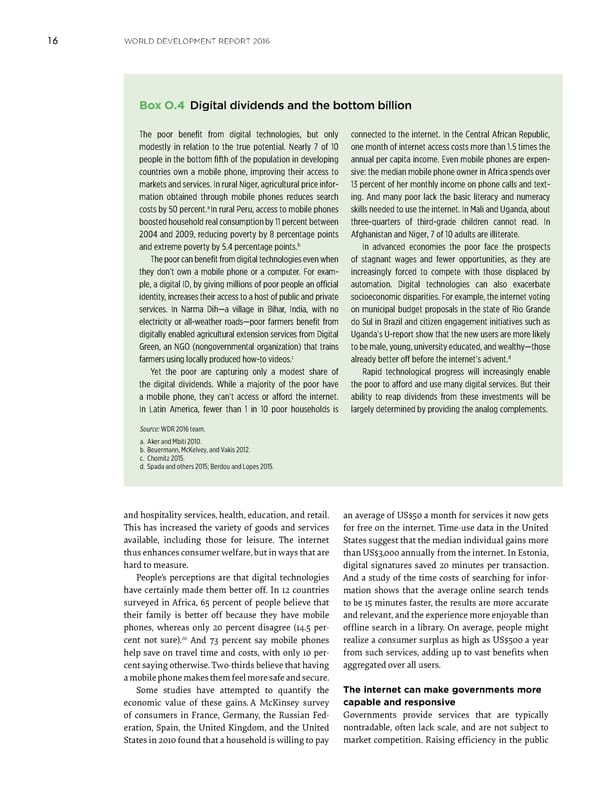WORLD DEVELOPMENT REPORT 2016 16 Box O.4 Digital dividends and the bottom billion The poor benefit from digital technologies, but only connected to the internet. In the Central African Republic, modestly in relation to the true potential. Nearly 7 of 10 one month of internet access costs more than 1.5 times the people in the bottom fifth of the population in developing annual per capita income. Even mobile phones are expen- countries own a mobile phone, improving their access to sive: the median mobile phone owner in Africa spends over markets and services. In rural Niger, agricultural price infor- 13 percent of her monthly income on phone calls and text- mation obtained through mobile phones reduces search ing. And many poor lack the basic literacy and numeracy costs by 50 percent.a In rural Peru, access to mobile phones skills needed to use the internet. In Mali and Uganda, about boosted household real consumption by 11 percent between three-quarters of third-grade children cannot read. In 2004 and 2009, reducing poverty by 8 percentage points Afghanistan and Niger, 7 of 10 adults are illiterate. b In advanced economies the poor face the prospects and extreme poverty by 5.4 percentage points. The poor can benefit from digital technologies even when of stagnant wages and fewer opportunities, as they are they don’t own a mobile phone or a computer. For exam- increasingly forced to compete with those displaced by ple, a digital ID, by giving millions of poor people an official automation. Digital technologies can also exacerbate identity, increases their access to a host of public and private socioeconomic disparities. For example, the internet voting services. In Narma Dih—a village in Bihar, India, with no on municipal budget proposals in the state of Rio Grande electricity or all-weather roads—poor farmers benefit from do Sul in Brazil and citizen engagement initiatives such as digitally enabled agricultural extension services from Digital Uganda’s U-report show that the new users are more likely Green, an NGO (nongovernmental organization) that trains to be male, young, university educated, and wealthy—those c d farmers using locally produced how-to videos. already better off before the internet’s advent. Yet the poor are capturing only a modest share of Rapid technological progress will increasingly enable the digital dividends. While a majority of the poor have the poor to afford and use many digital services. But their a mobile phone, they can’t access or afford the internet. ability to reap dividends from these investments will be In Latin America, fewer than 1 in 10 poor households is largely determined by providing the analog complements. Source: WDR 2016 team. a. Aker and Mbiti 2010. b. Beuermann, McKelvey, and Vakis 2012. c. Chomitz 2015. d. Spada and others 2015; Berdou and Lopes 2015. and hospitality services, health, education, and retail. an average of US$50 a month for services it now gets This has increased the variety of goods and services for free on the internet. Time-use data in the United available, including those for leisure. The internet States suggest that the median individual gains more thus enhances consumer welfare, but in ways that are than US$3,000 annually from the internet. In Estonia, hard to measure. digital signatures saved 20 minutes per transaction. People’s perceptions are that digital technologies And a study of the time costs of searching for infor- have certainly made them better off. In 12 countries mation shows that the average online search tends surveyed in Africa, 65 percent of people believe that to be 15 minutes faster, the results are more accurate their family is better off because they have mobile and relevant, and the experience more enjoyable than phones, whereas only 20 percent disagree (14.5 per- offline search in a library. On average, people might cent not sure).20 And 73 percent say mobile phones realize a consumer surplus as high as US$500 a year help save on travel time and costs, with only 10 per- from such services, adding up to vast benefits when cent saying otherwise. Two-thirds believe that having aggregated over all users. a mobile phone makes them feel more safe and secure. Some studies have attempted to quantify the The internet can make governments more economic value of these gains. A McKinsey survey capable and responsive of consumers in France, Germany, the Russian Fed- Governments provide services that are typically eration, Spain, the United Kingdom, and the United nontradable, often lack scale, and are not subject to States in 2010 found that a household is willing to pay market competition. Raising efficiency in the public
 World Development Report 2016 Page 28 Page 30
World Development Report 2016 Page 28 Page 30